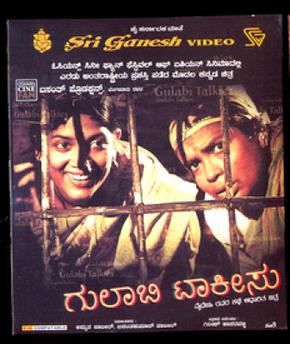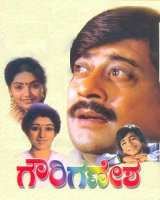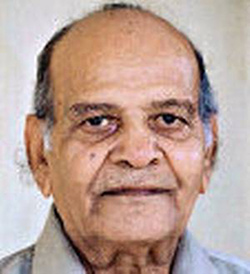
Sowmya Sathyanarayana, better known by her stage name Soundarya, was an Indian actress known for her works primarily in Telugu cinema. She was regarded as one of the greatest actresses in the history of Telugu cinema. She also acted in a few Kannada, Tamil, Hindi and Malayalam films. She has received three Nandi Awards, two Karnataka State Film Awards and six Filmfare Awards South. In 2002, she received the National Film Award for Best Feature Film as a producer for the Kannada film Dweepa.

Girish Kasaravalli is an Indian film director, in the Kannada cinema, and one of the pioneers of the Parallel Cinema. Known internationally for his works, Kasaravalli has garnered fourteen National Film Awards, including four Best Feature Films; Ghatashraddha (1977), Tabarana Kathe (1986), Thaayi Saheba (1997) and Dweepa (2002). In 2011, he was awarded with the Padma Shri, the fourth highest civilian award by Government of India.

Shivaramaiah Ramachandra Aithal, popularly known as S. Ramachandra, was a National Award winning Indian cinematographer. In 2006, he was honoured with Lifetime Contribution to Kannada Cinema Award at the Karnataka State Film Awards. He was recognised as a gifted cinematographer and as a force behind the offbeat films in Kannada cinema.

Dweepa is a 2002 Indian Kannada-language film by Girish Kasaravalli, based on the novel of the same name by Na D'Souza. It stars Soundarya, Avinash and M. V. Vasudeva Rao in the lead roles. The film deals with the raging issue of building dams and the displacement of natives. It won two National Film Awards, four Karnataka State Film Awards and three Filmfare Awards South.
Kraurya (transl. Cruelty) is a 1996 Indian Kannada language drama film directed by Girish Kasaravalli, based on a story written by T. N. Seetharam about an old woman who has to deal with complex relationships with people of different generations she is put up with. The title in Kannada literally means "cruelty". The cast includes Renukamma Murugodu in the lead role as Rangajji, and supporting roles played by Vishwas, H. G. Dattatreya and T. V. Gurumurthy.

Naayi Neralu is a 2006 Indian Kannada language film directed by Girish Kasaravalli, based on a novel of the same name by writer S. L. Bhyrappa and has Pavitra Lokesh in the lead role.

Jayamala is an Indian actress and politician. She served as the Minister for Women and Child Development and Empowerment of Differently Abled and Senior Citizens in the Government of Karnataka, by virtue of being a member of the Karnataka Legislative Council. She served as the female president of the Karnataka Film Chamber of Commerce between 2008 and 2010. Her popular Kannada films include Premada Kanike, Shankar Guru, Antha and Chandi Chamundi among several others. She has produced and acted in the award-winning Thaayi Saheba.
Samskara is a 1970 Indian Kannada-language film written by U. R. Ananthamurthy based on his eponymous novel, and directed and produced by Pattabhirama Reddy. Singeetam Srinivasa Rao was executive director for the film. It is considered a path-breaking film that pioneered the parallel cinema movement in Kannada. Samskara won the National Film Award for Best Feature Film (1970).

Gulabi Talkies is a 2008 Indian Kannada language drama film by acclaimed Indian director Girish Kasaravalli. The film stars Umashree in the title role, M. D. Pallavi and K. G. Krishna Murthy. It is based on a short story by the same name by Kannada writer Vaidehi.

Vaishali Kasaravalli was a noted Kannada actress, television serial director, and costume designer.

Gauri Ganesha is a 1991 Kannada-language comedy drama film directed by Phani Ramachandra. It stars Anant Nag, Vinaya Prasad, Master Anand, Mukhyamantri Chandru, Vaishali Kasaravalli, Ramesh Bhat among others.

Yelandur Narayan Ravindra, known mononymously by his stage name Avinash, is an Indian actor who appears predominantly in Kannada and Tamil films. He has been working in films for more than three decades. Known for his authentic portrayal of complex characters and versatility, Avinash is one of the most sought actors in the supporting category. He is one of the few actors to enjoy both critical and commercial success.
Koormavatara is a 2011 Indian Kannada drama film directed by Girish Kasaravalli, based on short story of the same name written by Kum. Veerabhadrappa. It stars Shikaripura Krishnamurthy, Jayanthi and Apoorva Kasaravalli in the lead roles, and Harish Raj, Cheswa, Rashmi Sumukha, Goa Dattu and Sumukha Bharadwaj feature in supporting roles. The story revolves around a government employee cast in a play to portray Mahatma Gandhi, who, on course, realizes that playing Gandhi is easier than imbibing and implementing his principles in real-life.

J. Chandulal Jain was a popular Kannada film director and producer of almost 40 films, notably, Thaaye Devaru, Bhootayyana Maga Ayyu, Tabbaliyu Neenade Magane, and Bhakta Siriyala. He also produced movies in Hindi, such as Godhuli and Pyaar Karke Dekho. His film Idu Saadhya was shot in just 48 hours.
S. Shivaram, popularly known simply as Shivaram or Shivaramanna, was an Indian actor, producer and director whose Kannada cinema career has spanned six decades. He has played roles including lead hero performances, character roles, comedic roles, as well as supporting parts. He teamed up with his elder brother, S. Ramanathan and produced several films under the name Rashi Brothers apart from directing Hrudaya Sangama in 1972. They together produced movies directed by Puttanna Kanagal like Gejje Pooje and Upasane. They also produced Dr. Rajkumar 's 175th movie Nanobba Kalla and the Tamil movie Dharma Durai starring Rajinikanth which was a remake of the 1989 Kannada movie Deva. The brothers together produced few Bollywood films as well including the 1985 movie Geraftaar which is known to be the only Indian movie to star three stalwarts - Amitabh Bachchan, Kamal Haasan and Rajinikanth - in a single movie. As an actor, Shivaram has the distinction of working with many stalwart directors out of which his association with Puttanna Kanagal is much remembered. He has acted in all the seven Kannada movies directed by Singeetam Srinivasa Rao starring Rajkumar.
The 46th Filmfare Awards South ceremony honouring the winners and nominees of the best of South Indian cinema in films released 1998, is an event that was held at the Lalitha Kala Thoranam, Public Gardens on 24 April 1999.The awards were distributed at Hyderabad.
Isaac Thomas Kottukapally was an Indian film score composer, music director and script writer working mainly in Malayalam, Kannada and Hindi films. He scored music for several English documentaries and commercials.
Hemanth M. Rao is an Indian film director and screenwriter who works in Kannada cinema. He rose to fame following the success of his directorial debut Godhi Banna Sadharana Mykattu (2016).











